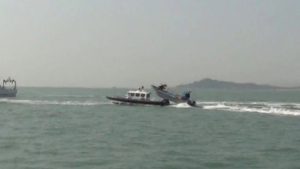Taiwan’s Coast Guard Administration (CGA) has reported that one of its vessels was damaged by Chinese speed boats last week. On Friday, the CGA said that an incident took place on March 16 involving the 9th Offshore Flotilla of the Taiwanese coast guard, based at Kinmen.
According to the CGA, more than 10 Chinese speedboats harassed two Taiwanese coast guard vessels. The harassment took the form of intentional ramming by the speedboats of the CGA vessels, both of which were patrol cutters. Crew on board the speedboats also threw rocks and bottles at the Taiwanese vessels, the CGA said.
According to Taiwan News, two Taiwanese coast guard patrol cutters, CP-1022 and CP-2006, had started operations to counter illegal fishing in the waters off Kinmen when the incident began. The cutters had been removing illegal fishing nets in the area when the Chinese speedboats — ostensibly occupied by fishermen — approached and harassed the Taiwanese vessels.
The Taiwanese CGA released images to local media detailing aspects of the incident. In one image, a Chinese speedboat is seen after ramming CP-1022. In the photograph, the speedboat is resting on the aft end of the cutter’s hull. CP-1022, the vessel involved in the incident, had entered active duty earlier this month.
The Taiwan coast guard crews responded to the harassment by using nonlethal means, including stun grenades and bean bag rounds. The vessels eventually retreated, according to local Taiwanese reports. According to one Taiwanese report, a CGA officer said that this type of incident was effectively unprecedented in its scope.
In recent years, Chinese fishermen — many part of Beijing’s “maritime militia” — have been part of state-backed operations against Chinese geopolitical adversaries. In the South China Sea and the East China Sea, Chinese fishermen have carried out illegal fishing operations in areas claimed by Beijing.
Relations between Beijing and Taipei have been poor since the January 2016 election of President Tsai Ing-wen and the independence-leaning Democratic Progressive Party. Last week’s incident off Kinmen comes after the opposition Kuomintang — generally seen as more friendly toward the Chinese Communist Party — elected a new leader, Johnny Chiang, who is more skeptical of Beijing.
The Kinmen Islands are adjacent to the Chinese mainland, making them a regular area for illegal Chinese fishing activities. Following the end of the Chinese civil war in 1949, Kinmen was the site of skirmish between the newly declared People’s Republic of China and the Republic of China. The islands were also attacked by the People’s Liberation Army during the First and Second Taiwan Strait crises in the mid- and late-1950s.

































